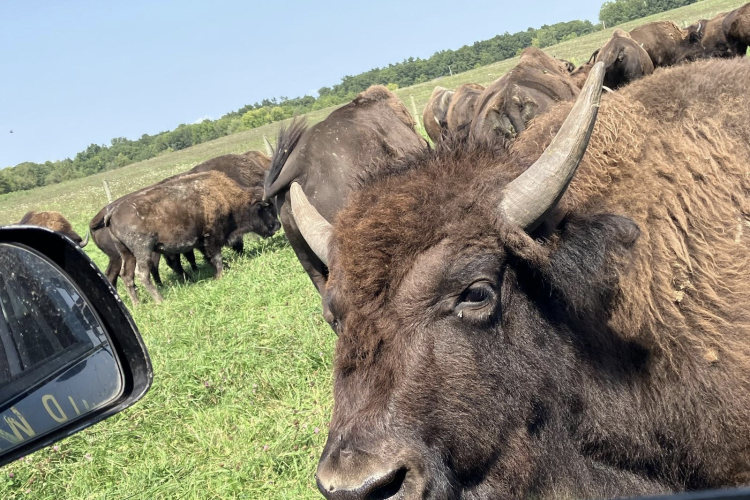Freeing Ourselves from Possessions

This article is part of our Pamphlets for Sharing series produced by QEW’s Publications Committee. Download the PDF here or order print copies by emailing info@quakerearthcare.org.
By Tom Small
FOR SOME TIME NOW, my house has been becoming more transparent. I can see across it, sometimes almost through it. There’s a little more clarity. More space.
Every few days I walk through it, very slowly. It’s a kind of spiritual exercise; I try to see more clearly a few of the things that are in it, without the veil of custom that ordinarily obscures them. I ask them a few nosy questions: What are you? What do you mean? Who do you belong to? Perhaps I move something away, into some other space; then I check a few days later to see how much of a shadow it left behind. Our perhaps the space it occupied has now become clear, transparent.
I discovered that many objects in my house have become accidental. They no longer belong here or to me (perhaps they never did). They are images of a self that I dreamed, a self that never fully emerged from the shadows. Once I know this, I’m free–to give the image away, as a gift for the person it really belongs to: my stepdaughter, my neighbor, the poor person on the street. Or I can exchange it for something I need.
“SUCH STUFF AS DREAMS”
We dream many selves during our lives. We accumulate objects/images which make these selves visible; thereby we gain status. It’s difficult, then, to part with the image, even if the self for which it stands has always been only a dream. “We are such stuff as dreams are made on,” says Shakespeare’s Prospero, and our “stuff” is made from dreams. When the dream, however, becomes only an object filling space, then it stands in our way.
Gifts, too, are embodiments of dream–somebody else’s dream of who we are. Perhaps we keep the gift in recognition of the giver and her dream. But the ancients were wiser. For the receiver of a gift to retain it for his own aggrandizement is to invite misfortune. The gift is in the giving, the action, not the thing itself, which must move. Or else lose its identity as gift.
THE ART OF TRANSPARENCY
- Try a spiritual journey through your home, just for the exercise. Meditate on you space as an ecosystem, a complex entity that consists entirely in relationships and endures by changing.
- Look past the shadows. Try to see through the object, into the space that it displaces. Possibly the walls will seem farther away, clearer, even transparent. Perhaps you will breathe more easily. Perhaps you will be free to act. Simplicity is not a noun; it ís an active verb.
- Discover who these things that stand in your way belong to now. The coat that won’t fit in the closet: It belongs to the poor. The antique too precious to use: That’s for the museum, for everyone. The boxes you never unpacked: straight to the fund-raising sale.
Most times it is not so easy; it takes a shock to make us see. A dozen years ago a visiting Episcopalian abbot, admiring my house, commented on how many “icons” I possessed. Startled to hear them so described, I worried for a long time over what he meant. It was a much greater shock when, a few years ago, I returned from travel in Africa to find that my ex-wife had moved out half the contents of the house. I was stunned. I made up lists of things I had to have back. Three weeks later I tore up all the lists–I realized I didn’t need any of those things.
Such shocks seem extra ordinary, but I think they come to us often: an unexpected word; a sudden change, loss, or separation; a flash of insight. If we open ourselves to its ministry, the shock releases energy, a new possibility. Suddenly we see things in a new light. In the luminous space “things” vanish into, perhaps we can discern more clearly who and where we are, and what we truly need.
As we learn the difference, we will free ourselves from our addictions. And free ourselves we must, if we are to live simply, possess our soul, and preserve the Earth, our home, allowing it as a gift to pass through our hands and onward, even to the seventh generation.•
Reprinted from “Leadings,” Volume 3, October 1994 (BeFriending Creation readers sharing their thoughts on spirit-led action)
FURTHER READING
Burch, Mark A. Simplicity. Philadelphia: New Society Publishers, 1995.
__________. Stepping Lightly: Simplicity for People and the Planet. Philadelphia: New Society Publishers, 2000.
Dacyczyn, Amy, et al. The Simple Life: Thoughts on Simplicity, Frugality, and Living Well. New York: Berkeley Books, 1998.
Dominguez, Joe, and Vicki Robin. Your Money or Your Life: Transforming Your Relationship with Money and Achieving Financial Independence. New York: Penguin, 1993.
Elgin, Duane. Voluntary Simplicity: Toward a Way of Life That is Outwardly Simple, Inwardly Rich. New York: William Morrow & Co., 1993.
Foster, Richard J. Freedom of Simplicity. San Francisco: HarperCollins, 1981.
Fromm, Erik. To Have or to Be? New York: Bantam Books, 1981.
Schumacher, E.F. Small is Beautiful. New York: Harper & Row, 1973.
Shi, David E. The Simple Life: Plain Living and High Thinking in American Culture. New York: Oxford University Press, 1986.
Thoreau, Henry David. Walden. New York: Bantam Books, 1989.


![Photo by Kathy Barnhart. She writes, “Chinese Houses, California Poppies, Lupines, Tidy Tips amidst the oak trees make such a wonderful palette. This area in Shell Ridge Open Space Preserve [CA] is tended by a large group of volunteers, encouraging native flowers and plants and weeding out invasives. What a gift they have given to all!”](https://quakerearthcare.org/wp-content/uploads/dynamic/2022/05/Native-California-Flowers-by-Kathy-Barnhart-750x500-c-default.jpg)